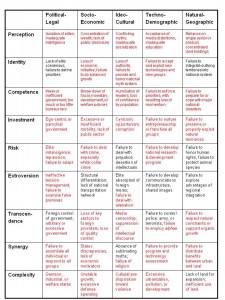Disciplining an Unruly Field: Terrorism Experts and Theories of Scientific/Intellectual Production
Lisa Stampnitzky
Qual Sociol DOI 10.1007/s11133-010-9187-4
Abstract
“Terrorism” has proved to be a highly problematic object of expertise. Terrorism studies fails to conform to the most common sociological notions of what a field of intellectual production ought to look like, and has been described by participants and observers alike as a failure. Yet the study of terrorism is a booming field, whether measured in terms of funding, publications, or numbers of aspiring experts. This paper aims to explain, first, the disjuncture between terrorism studies in practice and the sociological literature on fields of intellectual production, and, second, the reasons for experts’ “rhetoric of failure” about their field. I suggest that terrorism studies, rather than conforming to the notion of an ideal-typical profession, discipline, or bounded “intellectual field,” instead represents an interstitial space of knowledge production. I further argue that the “rhetoric of failure” can be understood as a strategy through which terrorism researchers mobilize sociological theories of scientific/cultural fields as both an interpretive resource in their attempts to make sense of the apparent oddness of their field and their situation, and as schemas, or models, in their attempts to reshape the field. I conclude that sociologists ought to expand our vision to incorporate the many arenas of expertise that occupy interstitial spaces, moving and travelling between multiple fields.
Keywords Terrorism . Experts . Knowledge . Boundary work

Phi Beta Iota: When “control fraud” is the prevalent paradigm, not only in governments, but in universities, corporations, and other notionally independent collections of thinkers, instead of rigor and precision you get intellectual incoherence. “Terrorism Studies,” as with Cyber-Security, are not serious precisely because they are opportunistic — they go after the ignorant client with money, and no one holds them accountable for failing to point out that the Emperor has no clothes. Terrorism is a tactic, not a threat. Terrorism is used by states to intimidate publics, and by individuals or small groups as a last resort hoping to inspire disproportionate (military) responses. The proper foundation for the study of terrorism is two levels down: whole systems (everything is connected, where are the failed feedback loops and information pathologies), and revolution (political-legal, socio-economic, ideo-cultural, techno-demographic, and natural-geographic). The US policy, acquisition, operations, and intelligence communities are blissfully ignorant of the real world because their money supply is completely independent of any evidence-based reasoning, and they are not held accountable for actually producing useful outcomes — all that matters to them is that the money keep flowing, and all that matters to the US Congress is that money keep flowing to assure the 5% kick-back to political action campaigns.
See Also:
2012 PREPRINT FOR COMMENT: The Craft of Intelligence
2011 Thinking About Revolution in the USA and Elsewhere (Full Text Online for Google Translate)
2009 Intelligence for the President–AND Everyone Else
2009 Perhaps We Should Have Shouted: A Twenty-Year Retrospective
2002: New Rules for the New Craft of Intelligence (Full Text Online for Google Translate)
1998 JFQ The Asymmetric Threat: Listening to the Debate
1992 E3i: Ethics, Ecology, Evolution, & intelligence (Full Text Online for Google Translate))
Graphic: Pre-Conditions of Revolution
Graphic: Preconditions of Revolution in the USA Today



